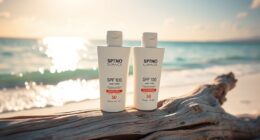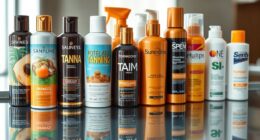To protect your skin from UV rays, choose a broad-spectrum sunscreen with SPF 30 or higher and reapply every two hours, especially after sweating or swimming. Wear a wide-brimmed hat, sunglasses, and light protective clothing, and seek shade during peak hours. Remember, UV exposure can lead to premature aging and increase skin cancer risks. Stay informed about the best products and tips to keep your skin healthy now and in the future.
Key Takeaways
- Use broad-spectrum sunscreen with SPF 30 or higher, and reapply every two hours when outdoors.
- Choose sunscreen formulations suited to your skin type, such as mineral or chemical options.
- Protect skin with physical barriers like wide-brimmed hats, sunglasses, and protective clothing.
- Seek shade during peak UV hours (10 a.m. to 4 p.m.) to minimize sun exposure.
- Regularly reapply sunscreen after sweating, swimming, or extended outdoor activities for ongoing protection.

While many men overlook the importance of sun protection, it’s a essential step in maintaining healthy skin and preventing long-term damage. One of the most effective ways to shield yourself from harmful rays is choosing the right sunscreen. Sunscreen formulation plays a critical role in how well it protects your skin. Look for broad-spectrum options that defend against both UVA and UVB rays, as these are responsible for skin aging, burns, and increased cancer risk. The formulation should suit your skin type—whether it’s oily, dry, or sensitive—to guarantee comfortable, consistent application. Mineral sunscreens with zinc oxide or titanium dioxide are often gentler and less likely to cause irritation, making them a good choice if you have sensitive skin. Conversely, chemical sunscreens contain active ingredients like avobenzone, oxybenzone, or octocrylene, which absorb UV rays and convert them into heat. These can be more lightweight and easier to apply, but some men prefer mineral options for their less greasy feel and added skin benefits.
Understanding UV exposure risks is essential, especially since many men underestimate how quickly sun damage can accumulate. UV radiation can penetrate clouds and reflect off surfaces like water, sand, or concrete, increasing your risk even on cloudy days or during quick outdoor errands. Regularly exposing your skin to UV radiation without protection accelerates premature aging—think wrinkles, sunspots, and loss of elasticity—and greatly raises your chances of developing skin cancer. That’s why applying a broad-spectrum sunscreen with an SPF of at least 30 is indispensable, especially if you spend extended periods outdoors. Reapplication is equally important; reapply every two hours or immediately after sweating or swimming. Many men skip this step, thinking a single application at the start of the day is enough, but UV exposure risks demand consistent coverage. Additionally, understanding sunscreen formulation options can help you choose the most effective product for your needs.
In addition to sunscreen, consider other protective measures like wearing a wide-brimmed hat, sunglasses, and protective clothing. Seeking shade during peak sun hours, typically between 10 a.m. and 4 p.m., can dramatically cut down your UV exposure risks. Remember, sun protection isn’t just about preventing immediate discomfort like sunburn; it’s about safeguarding your skin for the long haul. By understanding sunscreen formulation options and respecting UV exposure risks, you take proactive steps toward maintaining healthier skin and reducing your chances of serious skin issues later in life. Make sun protection a regular part of your routine—your skin will thank you for it.
Frequently Asked Questions
Can Men Develop Skin Cancer Even Without Sunburns?
Yes, men can develop skin cancer even without sunburns. Skin cancer risks increase with cumulative sun exposure over time, not just from sunburns. Regular sun exposure, especially without protection, damages your skin gradually, raising your chances of developing skin cancer later. Wearing sunscreen, seeking shade, and covering up minimize this risk, helping you protect your skin even if you haven’t experienced sunburns.
How Often Should Men Reapply Sunscreen During Outdoor Activities?
Did you know that reapplying sunscreen every two hours can cut your skin cancer risk considerably? During outdoor exposure, you should reapply sunscreen at least every two hours, or more often if you’re sweating or swimming. This guarantees continuous protection against UV rays. Don’t forget, reapplication is essential for maintaining an effective barrier, especially during prolonged outdoor activities, so stay vigilant and keep your skin safe.
Are There Specific Sunscreens Recommended for Men’s Skin Types?
You should look for sunscreens formulated for men’s skin types, which often handle oil and sweat better. Choose formulations labeled as oil-free, non-comedogenic, or matte finish to suit your skin. If you have sensitive skin, opt for mineral-based or fragrance-free options. Always check the label for broad-spectrum protection and at least SPF 30. Testing a small amount first can help verify it suits your skin without irritation.
Does Facial Hair Affect the Effectiveness of Sunscreen Application?
Facial hair can make it trickier to get even sunscreen application, but it doesn’t block protection entirely. Your facial hair might create gaps where sunscreen doesn’t fully reach the skin, but applying a generous amount and using a stick or spray formula helps. Make sure to massage the sunscreen into the skin beneath your beard or mustache to ensure effective coverage. Regular reapplication is key for consistent sun protection.
Can Men Use Sunscreen Under Their Daily Moisturizer or Aftershave?
Yes, you can use sunscreen under your daily moisturizer or aftershave. Just make certain your sunscreen is compatible with your moisturizer and that you layer correctly. Apply your moisturizer or aftershave first, wait a few minutes for it to absorb, then apply the sunscreen evenly. This layering helps protect your skin without reducing the effectiveness of either product, keeping you safe from the sun’s rays.
Conclusion
Now that you know the essentials of sun protection, it’s time to take action. Think of your skin as a shield that needs regular armor to stay strong and healthy, just like a knight prepares for battle. Applying sunscreen, wearing protective clothing, and seeking shade are simple steps that make a big difference. Stay vigilant and keep your skin safe—because protecting yourself is as crucial as catching the perfect wave on a sunny day.









